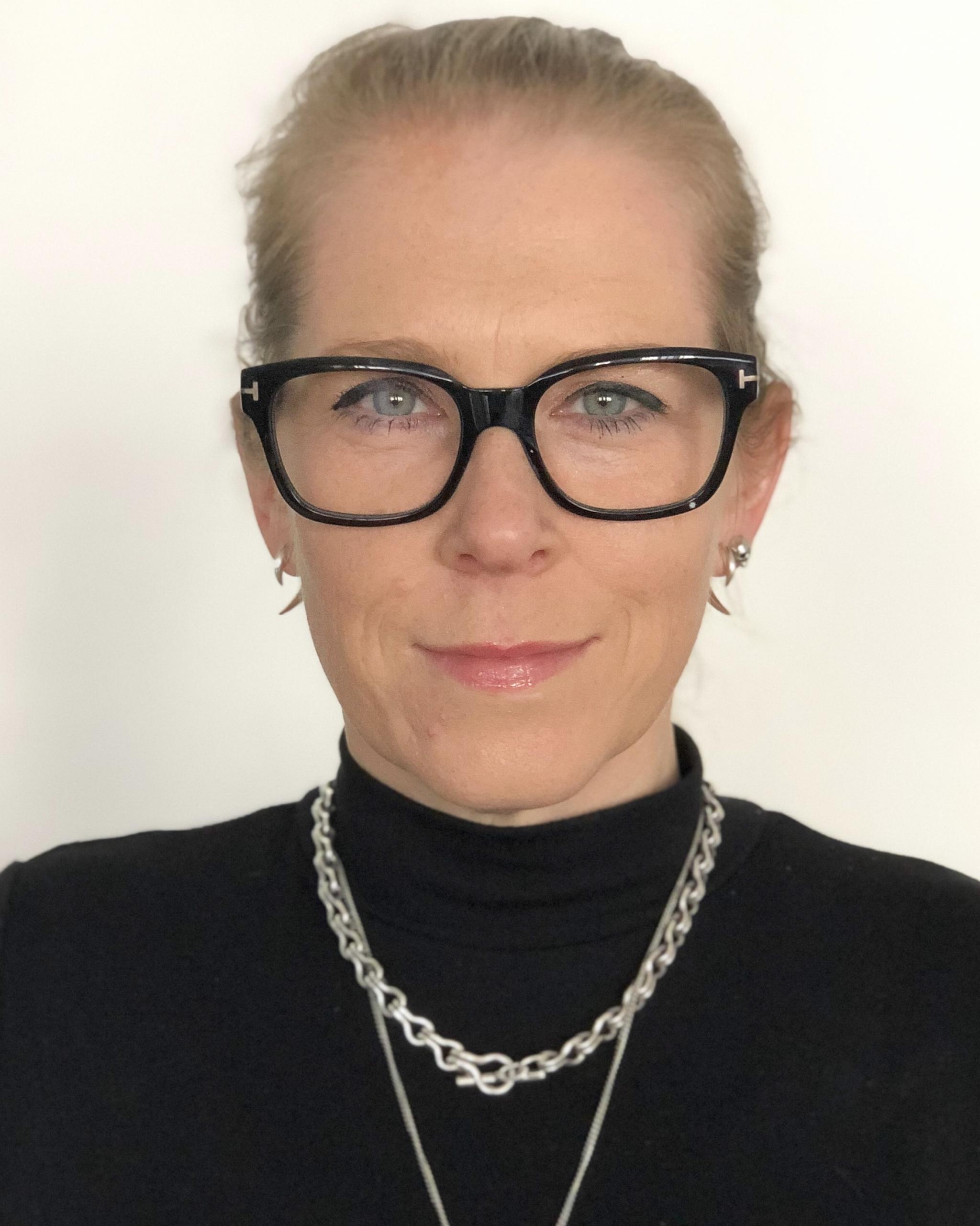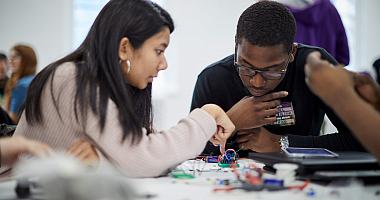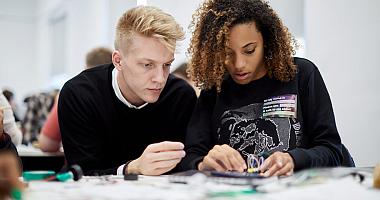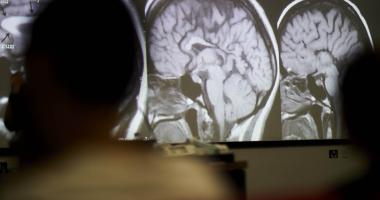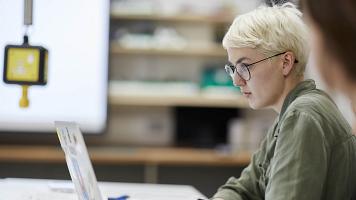BSc (Hons)
Digital Arts Computing
Content navigation menu
Why study BSc Digital Arts Computing at Goldsmiths
This degree will prepare you for a career in the creative industries, enabling you to learn and explore through a combination of technology and embedded creative practice.
- The degree places you at the centre of one of the fastest growing creative industries in the world, pioneering new approaches to computational creative practice. Digital arts computing is a unique interdisciplinary field where some of the most exciting and progressive developments at the intersection of emergent technologies, fine art practice and media culture are currently found.
- You don’t need to know how to code to apply for this course. You'll learn the fundamentals of programming and acquire industry-ready technical skills during the degree.
- You’ll develop your creative practice incrementally on both a technical and conceptual level through technical labs, creative project studio sessions, and critical studies seminars and lectures. So you'll grow as a technical expert, but also as a critical creative thinker and innovative problem solver.
- With an emphasis on learning through doing, you will build your professional portfolio and develop a series of projects that will be exhibited publicly in exhibitions throughout the three years you study at Goldsmiths.
- During the degree you’ll be able to select specialist modules to gain practical knowledge of areas such as generative art and machine learning, physical computing, VR and immersive technology, motion capture, sound and signal processing and games engines.
Contact the department
If you have specific questions about the degree, contact Rachel Falconer.
UCAS code
I150
Entry requirements
A-level: BBB
BTEC: DDM
IB: 33 points overall with Three HL subjects at 655
Length
3 years full-time
Fees
Home - full-time: £9250
International - full-time: £20160
Departments
Computing
Art
Produce original work using state-of-the-art facilities
During the degree you will produce works across a diverse range of media – not just on a screen.
You will have access to the amazing Goldsmiths HatchLabs – our state-of-the-art physical computing maker space – and be supported by studio technicians to develop and prototype your creative projects. It's where you'll be introduced to a variety of digital and physical tools including 3D printing, laser cutting machines and Arduinos.
You'll also have access to a range of other facilities including motion capture, virtual reality, 360 immersive cinema and audio visual equipment, performance spaces, robotics, wearable technologies, woodworking, digital sculpture and embroidery.
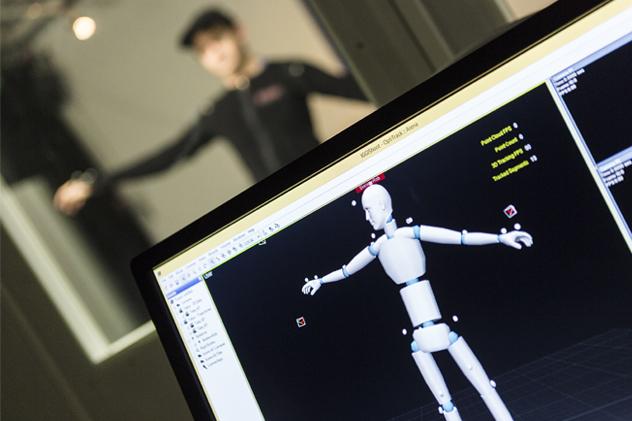
Computing facilities at Goldsmiths include a VR lab equipped with a full multi-camera motion capture studio, similar to that used in the making of Avatar and The Last of Us.
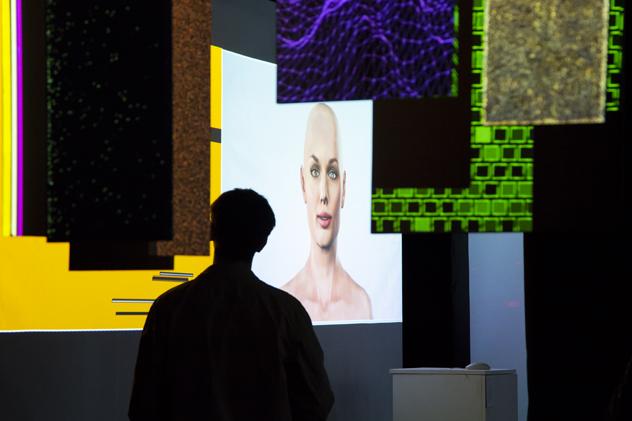
The campus is a creative place, and you'll have the opportunity to be inspired by student work at imaginative events like the annual Goldsmiths degree shows.
Get taught by experts in the field
Your lecturers and the technical support staff on the degree are practising artists, creative technologists, curators and writers. They are therefore uniquely positioned to support and critically respond to your work to help ensure that it engages with the critical and technological context in which it is made.
Immerse yourself in a creative community
As part of the BSc Digital Arts Computing cohort you will be invited to attend regular Forums that welcome all three year groups to show and critique work together as a close-knit community of practitioners.
We invite guest artists, creative technologists and curators to join us for presentations, workshops and 'crits', and you will also be able to participate in field trips to museums, festivals, galleries, studios and creative technology centres across London. This will give you exposure to practices that will heighten your awareness of digital art as a field.
We regularly invite world-class artists and curators to visit Goldsmiths to deliver Masterclasses where they explain their work and can engage in critical dialogue with students. This enables you to develop a wider understanding of the contemporary art scene and how your work sits within the professional art world.
Grow your professional and creative network
As part of the BSc Digital Art Computing programme you’ll be part of a vibrant community of students and alumni, and you’ll be supported by a network that includes academic personal tutors, career advisers, disability officers and other student support staff.
Our labs and lectures are run as small working groups and you will be sharing your critical studies lectures and seminars with students from the Department of Art to further broaden your peer network.
You'll have the opportunity to grow your professional network through participation in workshops, studio visits and guided field trips. There are also opportunities for residencies and collaborations with creative studios – and art and technology publications – to further amplify and develop your practice.
Exhibition opportunities
Every year of the degree you will have the opportunity to exhibit your work. Internationally renowned practitioners and experts can be invited to take part in your public programme as part of your exhibition. Current and past collaborations have been with internationally renowned institutions and cultural centres including:
What you'll study
Overview
The programme is made up of three components:
- Computational arts practice. This will combine technical and creative skills and will be taught by practising computational artists in the Department of Computing.
- Critical studies of contemporary art, to provide you with a space for examining the historical and critical context in which art is made, seen and understood. This will be taught in the Department of Art.
- Core technical computing, with a particular focus on audio-visual technology. This will be taught in the Department of Computing.
Year 1
In your first year, you'll take the following compulsory modules:
| Module title | Credits |
|---|---|
| Introduction to Programming | 15 credits |
| Critical Studies in Computational Arts I | 30 credits |
| Creative Project 1 | 15 credits |
| Graphics 1 | 15 credits |
| Front End Web | 15 credits |
| Introduction to Digital Media | 15 credits |
| Sound and Signal 1 | 15 credits |
Note about optional modules (if available): The above is indicative of the typical modules offered, but is not intended to be construed or relied on as a definitive list of what might be available in any given year. The module content and availability is subject to change.
Teaching style
This programme is taught through a mixture of lectures, tutorials, workshops and laboratory sessions. You’ll also be expected to undertake a significant amount of independent study. This includes carrying out required and additional reading, preparing topics for discussion, and producing essays or project work.
How you'll be assessed
You’ll be assessed by a variety of methods, depending on your module choices. These may include coursework, examinations, group work and projects.
Credits and levels of learning
An undergraduate honours degree is made up of 360 credits – 120 at Level 4, 120 at Level 5 and 120 at Level 6. If you are a full-time student, you will usually take Level 4 modules in the first year, Level 5 in the second, and Level 6 modules in your final year.
Careers
The degree is designed to prepare you for a wide range of careers in the creative industries – whether you're interested in becoming an independent digital artist, a professional in the gaming industry, a technology-led creative working in the media, or something completely different.
The explosive and ever-growing use of technology in business and commerce means that there's a whole range of different career possibilities for you.
Where do Goldsmiths computing graduates work?
Some of the recent graduate-level careers for computing alumni have included:
- Professional artist
- Curating and exhibition design
- Film/TV special effects and post-production
- Visual interface designer
- Computer graphics designer
- Video game developer
- Music production
- Multimedia systems analyst
- Media and entertainment industries
- Mobile app developer
- Web developer
- Computer music/sound engineer
- Interface designer
- Database manager
Employers include:
Our graduates are also working in the following areas:
- Cultural industries
- IT consultancies
- Architecture firms
- Design studios
- Financial institutions
You can read more about possible career options after you graduate on our computing careers page.
This programme is also a pathway into Masters-level study in a variety of computing disciplines.
Skills
This degree is designed to prepare you for a career as a technology-led creative in the media industries. The programme will develop you not just as a technical expert, but also as a creative thinker, allowing you to learn and explore through a combination of technology and imagination.
Technical skills you'll develop throughout the degree will include:
- A strong understanding of how to design, develop and apply software in all areas of commerce and industry
- An awareness of the fundamentals of computing (hardware, software, architecture and operating systems)
- Professional-level programming skills and an understanding of programming languages
- Creative technology skills – from coding languages such as C++ to sound programming, immersive environments, computational art techniques, and physical computing such as 3D printing and electronics
- A clear sense of the issues involved in building and maintaining reliable software for the sophisticated demands of today's market and for the software industry as it develops throughout the 21st century
- An understanding of the social context and visual design aspects of software development together with the technical skills of programming
The degree features a large proportion of practical work in which you must deliver software projects, both individually and in groups. This mirrors as closely as possible a real-world work environment.
These projects develop your technical skills but also require you to tackle the broader aspects of the software development process, such as understanding users' needs and requirements and the design of interfaces on a number of platforms – from web pages to touchscreen phones.
You'll also gain skills in teamwork, creative thinking, problem solving, report writing, time management and organisation, presenting reasoned arguments to a range of audiences, and retrieval of information – all of which are sought by graduate employers.
We have dedicated employability resource within the department to build employer relations and manage additional initiatives to support your future career opportunities, including regular communication of external opportunities for mentoring and work experience, and an annual career week where you can access alumni panels and a range of industry talks.
Entry requirements
We accept the following qualifications:
A-level: BBB
BTEC: DDM
International Baccalaureate: 33 points overall with Three HL subjects at 655
UAL Extended Diploma: Merit overall
Access: Pass with 45 Level 3 credits including 30 Distinctions and a number of merits/passes in subject-specific modules
Scottish qualifications: BBBBC (Higher) or BBC (Advanced Higher)
European Baccalaureate: 75%
Irish Leaving Certificate: H2 H2 H2 H2
Additional requirements
Portfolio
We request up to 12 items of work for portfolio – these can be images or videos of sculpture, painting, drawings, digital work or any other work that gives us an understanding of your practice. We will request to see a portfolio when invited for an in person interview.
GCSE Maths
You should ideally have Grade B/Grade 6 or above in GCSE Maths. If your portfolio is particularly strong we may accept a slightly lower GCSE Maths grade.
Alternative qualifications and experience
See our full list of undergraduate entry qualifications.
We welcome students with a range of educational experiences. If you believe you may not meet the standard qualification requirements we would still encourage you to apply because we consider all aspects of your application when making a decision.
We’ll pay particularly careful attention to your personal statement, which is your opportunity to demonstrate your interest in the subject you’ve applied for. Your referees are also welcome to include any relevant contextual comments around your academic achievements. We’ll look at all these things when making a decision on your application, as well as your qualifications and grades, and may still be able to offer you a place.
International qualifications
We also accept a wide range of international qualifications. Find out more about the qualifications we accept from around the world.
If English isn’t your first language, you will need an IELTS score (or equivalent English language qualification) of 6.0 with no element lower than 5.5 to study this programme. If you need assistance with your English language, we offer a range of courses that can help prepare you for degree-level study.
Fees and funding
Annual tuition fees
These are the UG fees for students starting their programme in the 2024/2025 academic year.
- Home - full-time: £9250
- International - full-time: £20160
If your fees are not listed here, please check our undergraduate fees guidance or contact the Fees Office, who can also advise you about how to pay your fees.
It’s not currently possible for international students to study part-time if you require a Student Visa, however this is currently being reviewed and will be confirmed in the new year. Please read our visa guidance in the interim for more information. If you think you might be eligible to study part-time while being on another visa type, please contact our Admissions Team for more information.
If you are looking to pay your fees please see our guide to making a payment.
Funding opportunities
We offer a wide range of scholarships and bursaries, and our Careers Service can also offer advice on finding work during your studies. Find out more about funding your studies with us.
Additional costs
In addition to your tuition fees, you'll be responsible for any additional costs associated with your course, such as buying stationery and paying for photocopying. You can find out more about what you need to budget for on our study costs page.
There may also be specific additional costs associated with your programme. This can include things like paying for field trips or specialist materials for your assignments. Please check the programme specification for more information.
Rachel Falconer (joint head of programme)
Rachel is co-head of the BSc Digital Arts Computing and a Lecturer in the Department of Computing. She is a digital art curator, researcher, writer and educator operating at the critical intersections of contemporary art practice, feminist technoscience, emergent technologies, civic data infrastructures and networked culture. Rachel has conceived and delivered multi-scale interdisciplinary public programming, alternative exhibition models and innovative public research platforms spanning a diversity of critical modes of engagement with technology.
Audrey Samson (joint head of programme)
Audrey is co-head of the BSc Digital Arts Computing and a lecturer in Fine Art (Critical Studies) in the Department of Art. Resident at the Somerset House Studios, she is a critical technical practitioner in the métis duo FRAUD, which develops forms of art-led inquiry into the multiple scales of power and necropolitics that flow through physical and cultural spaces.
Atau Tanaka
Atau bridges the fields of media art, experimental music, and research. Active in the Tokyo noise music and media arts scenes, he moved to Paris with a residency at the Cité des Arts to work at IRCAM, was Artistic Ambassador for Apple France, and was researcher at Sony Computer Science Laboratory Paris. Atau creates sensor-based musical instruments for performance and exhibition, and is known for his work with biosignal interfaces. His recent work seeks to harness collective musical creativity in mobile environments, seeking out the continued place of the artist in democratised digital forms.
Edgar Schmitz
Edgar is senior lecturer in Fine Art (Critical Studies) at Goldsmiths. He is an artist and co-director of A Conversation in Many Parts, the international discursive platform for contemporary art and concepts. Recent exhibitions include British Art Show 7, Hayward Gallery, ICA London. His book on ambient attitudes is under negotiation with Sternberg Press, Berlin/ NY.
Sylvia Pan
Sylvia is a Lecturer in Virtual Reality. Working in VR for more than 10 years she developed a unique interdisciplinary research profile with journal and conference publications in both VR technology and social neuroscience. Her work in training and education in VR has been featured multiple times in the media, including BBC Horizon and the New Scientist magazine. More info can be found on Sylvia's website.
Richard Noble
Richard's main area of scholarly interest is in visual art that engages in one way or another with the political; he is interested in the political impact of visual art and also the boundaries between aesthetics and politics. His interests are primarily philosophical, but over the course of the last four years he has written about a fairly wide range of artists as well as the theoretical problems associated with art and politics.
Ros Gray
Ros is Senior Lecturer in Fine Art, Critical Studies in the Art Department at Goldsmiths. Her research explores the trajectories of militant filmmaking, particularly in relation to liberation struggles and revolutionary movements in Mozambique, Angola, Portugal, Guinea-Bissau and Burkina Faso, and more recently with the intersections between artistic practices and decolonial environmentalism.
Stephen Johnstone
Stephen has worked in collaboration with Graham Ellard since 1993. Their work is concerned with the relationship between pre-cinematic spectacle and immersive space and abstract film and cinematic spectacle. This body of work exists at the intersection of architecture and film and draws on and emphasises the architectural qualities of the projected video image to create an immersive and dynamic space that the spectator experiences as a kind of performer. Most recently, their work has engaged with the conventions of representing architectural space in film.
Susan Kelly
Susan is a writer, artist, organiser and educator. She researches the relationships between art and micropolitics: where the production of subjectivity becomes a crucial site for analysing and intervening in the reproduction of capitalism, imperialism, art and culture. She has worked in performance, video, installation, drawing, and public / site-based intervention. More recently, she has been focused on writing and co-producing workshops and research processes using various forms of participatory militant investigation.
